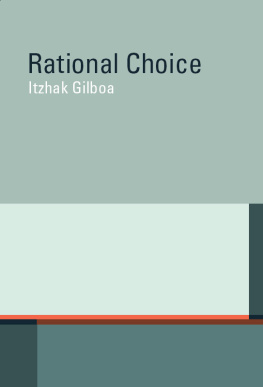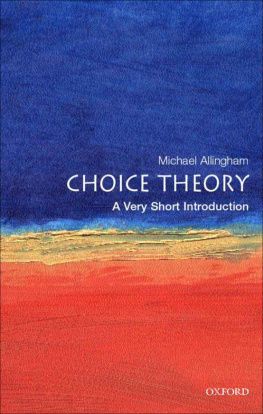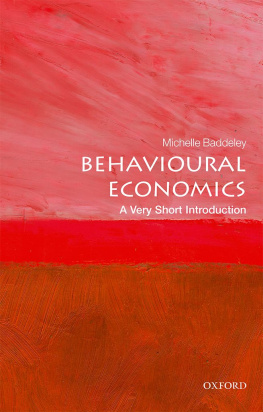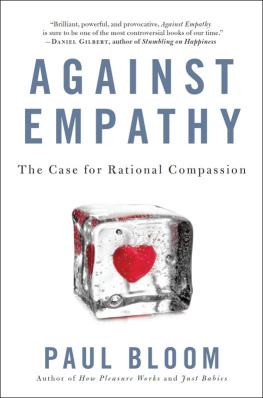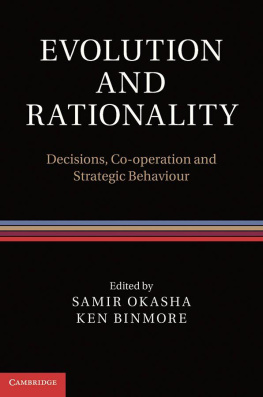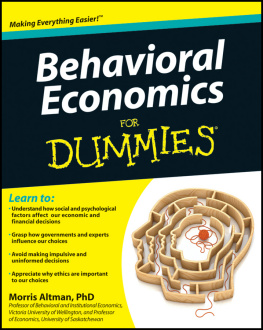Choice Theory: A Very Short Introduction
Michael Allingham
CHOICE THEORY
A Very Short Introduction


Great Clarendon Street, Oxford OX 2 6 DP
Oxford University Press is a department of the University of Oxford. It furthers the Universitys objective of excellence in research, scholarship, and education by publishing worldwide in
Oxford New York
Auckland Bangkok Buenos Aires Cape Town Chennai Dar es Salaam Delhi Hong Kong Istanbul Karachi Kolkata Kuala Lumpur Madrid Melbourne Mexico City Mumbai Nairobi
So Paulo Shanghai Taipei Tokyo Toronto
Oxford is a registered trade mark of Oxford University Press
in the UK and in certain other countries
Published in the United States
by Oxford University Press Inc., New York
Michael Allingham 2002
The moral rights of the author have been asserted
Database right Oxford University Press (maker)
First published as a Very Short Introduction 2002
All rights reserved. No part of this publication may be reproduced, stored in a retrieval system, or transmitted, in any form or by any means, without the prior permission in writing of Oxford University Press, or as expressly permitted by law, or under terms agreed with the appropriate reprographics rights organizations. Enquiries concerning reproduction outside the scope of the above should be sent to the Rights Department, Oxford University Press, at the address above
You must not circulate this book in any other binding or cover
and you must impose this same condition on any acquirer
British Library Cataloguing in Publication Data
Data available
Library of Congress Cataloging in Publication Data,
Data available
ISBN 0-19-280303-4
3 5 7 9 10 8 6 4 2
Typeset by RefineCatch Ltd, Bungay, Suffolk
Printed in Great Britain by
TJ International Ltd., Padstow, Cornwall
Contents
Preface
Albert Einstein introduces his brilliant exposition, Relativity, in the following terms.
The present book is intended, as far as possible, to give an exact insight into the theory of relativity to those readers who, from a general scientific and philosophical point of view, are interested in the theory, but who are not conversant with the mathematical apparatus of theoretical physics. The work presumes a standard of education corresponding to that of a university matriculation examination, and, despite the shortness of the book, a fair amount of patience and force of will on the part of the reader. The author has spared himself no pains in his endeavour to present the main ideas in the simplest and most intelligible form.... May the book bring some one a few happy hours of suggestive thought!
Apart from substituting choice for relativity and logic for physics I can find no better way to express the aim of this book.
Choice theory explores the reasoning which underlies coherent patterns of choice: it explores what it means to act rationally. Why is this important? As Aristotle reminds us, the origin of action is choice, and that of choice is desire and reasoning... good action and its opposite cannot exist without a combination of intellect and character. Choice theory develops the intellectual reasoning which is necessary for good action: the character which is also necessary for this is up to you.
The book is short not because it covers a small territory, but because it does not go into exhaustive detail of the territory which it does cover. Many interesting sights are mentioned, but in many cases only incomplete directions are given for finding them: the book is more a guide than a gazetteer. Many arguments are missing, or only sketched: the reader may like to supply, or complete, these, and would do well to do so where this is suggested by phrases such as it is easy to see that. The notes at the end of the book indicate where help may be found, and also warn of the ascents which even the more intrepid explorer might be unwise to attempt. A number of open questions and paradoxes are raised but not resolved, though guidelines which might help the reader find his own resolution are indicated: the reader must take his own views on such matters.
I am grateful to Shelley Cox of Oxford University Press for suggesting that I write this book and for commenting on the manuscript, and to those of my family and friends who too have provided comments. I am also grateful to the University of Siena for providing an ideal ambience in which to reflect on the underlying ideas, and to Magdalen College for giving me a period of leave in which to transform these into words.
List of illustrations
The Choice of Hercules
Ashmolean Museum, Oxford
A menu
Bodleian Library, University of Oxford
A family tree of choice theory
The Thinker
Ashmolean Museum, Oxford
A map of choice under certainty
A compound gamble
Alcove not winning
Satellite Information Services, London
A map of choice under uncertainty
A utility schedule
Roulette
Corbis
Gambling and insuring
The Game of Draughts
Ashmolean Museum, Oxford
A map of strategic choice
A ballot paper
AP Photo
A map of group choice
Chapter 1
Choice and desire
Choose life. Choose a job. Choose a career. Choose a family. Choose a big television, choose washing machines, cars, compact disc players and electrical tin openers. Choose good health, low cholesterol and dental insurance. Choose fixed-interest mortgage repayments. Choose a starter home. Choose your friends. Choose leisurewear and matching luggage. Choose a three-piece suite on hire purchase... Choose your future. Choose life.
But why should I want to do a thing like that? I chose not to choose life: I chose something else. And the reasons? There are no reasons. Who needs reasons?
Thus the opening voice-over of the film Trainspotting. But is the speaker, one Renton, choosing rationally? His choice of something else rather than life is his concern: it may not be my choice or yours, but it cannot, by itself, be irrational. De gustibus non disputandam est, as they say. But his claiming to have no reason is a different matter for, as language suggests and as we shall see, there is an intimate connection between reason and rationality. Indeed, Renton himself soon provides a reason:
People think its all about misery and desperation and death and all that shite, which is not to be ignored, but what they forget is the pleasure of it. Otherwise we wouldnt do it. After all, were not stupid. At least, were not that stupid.
And, with an enviable practicality, he continues:
When youre on junk you have only one worry: scoring. When youre off it you have to worry about all sorts of other shite. Got no money: cant get pished. Got money: drinking too much. Cant get a bird: no chance of a ride. Got a bird: too much hassle. You have to worry about bills, about food, about some football team that never wins, about human relationships and all the things that really dont matter.
All choices, just as Rentons, arise from both the heart and the head. The heart provides the passion and the head the reasons. Choices based on the most minute reasoning but lacking any desire are vacuous. But desire without reason is impotent: it is fit only for the enraged child who wants both to go home and not to go home.

Next page



